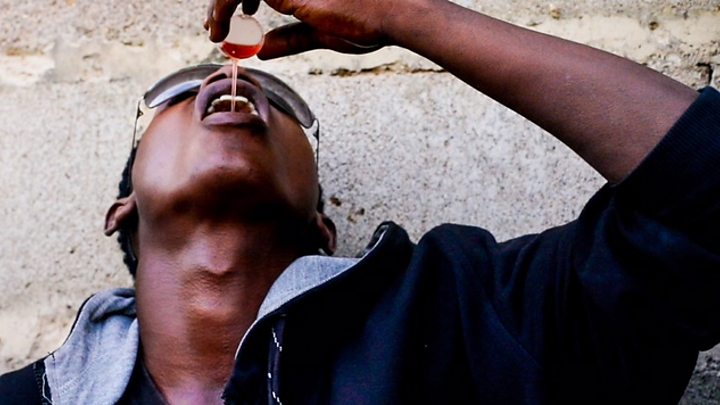
A former Nigerian pharmaceuticals executive who was implicated in a BBC investigation into the illegal sale of addictive opioids has been arrested.
Chukwunonye Madubuike was detained west of Lagos, close to the border with Benin, police said.
He went on the run in May after he was filmed illegally selling codeine syrup to an undercover BBC reporter.
Police said he told them he thought he was selling to a genuine businessman and regretted not checking his ID.
The BBC documentary exposed the extent of addiction to the codeine-based cough mixture among Nigeria’s youth.
Codeine is a painkiller, which is highly addictive and if taken to excess can cause organ failure and trigger schizophrenia.
The Africa Eye film also exposed the black market practice of selling the medicine to people without a doctor’s prescription or a pharmaceutical licence.

Chukwunonye Madubuike was a business development executive with Emzor pharmaceuticals, who sacked him after the film was aired.
Lagos State Commissioner of Police Imohimi Edgal said the arrest was made in the border town of Idiroko in Ogun State. He had been heading to Cotonou in Benin.
He said Emzor had reported Mr Madubuike in May on suspicion of having “knowingly supplied the controlled drugs to persons who were not supposed to have access to them contrary to” Nigerian law.
Mr Edgal went on to say Mr Madubuike, in his statement, said he was “was only trying to meet his sales target”, acknowledged he should have carried out greater checks to verify the identity of the person he was dealing with and “regretted selling controlled substances to unauthorised persons”.
Since the documentary was aired, more than 2.4 million codeine syrup bottles have been recalled and a number of pharmacists and small-time dealers have been arrested. Hundreds of people turned up to public screenings of the documentary, and it has helped raise awareness of the problem in other African countries.
Codeine cough syrup – the scale of the problem
- Codeine is a pain killer but also an addictive opioid. Taken in excess, it can cause schizophrenia and organ failure
- Codeine syrup is commonly mixed with soft drinks and often consumed by students
- The codeine is imported, but the syrup is made in Nigeria by more than 20 pharmaceutical companies
- Nigeria’s drug enforcement agency is fighting this epidemic. In a recent raid, it seized 24,000 bottles of codeine syrup from a single lorry in Katsina
- Codeine syrup addiction is a problem across Africa, with reports of addiction in Kenya, Ghana, Niger, and Chad
- In 2016, India banned multiple brands of codeine cough syrup following reports of addition
BBC



